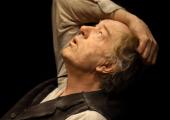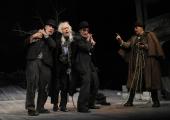Watt, Barbican Pit Theatre

Barry McGovern and Samuel Beckett's bleak brilliance dazzle
It begins with a tall, thin man walking out of light and into darkness. There is much that remains murky in Barry McGovern’s adaptation of this novel by Samuel Beckett, written between 1941 and 1945 when Beckett, who had worked for the Resistance, was in the South of France on the run from the Nazis, and not published until nearly a decade after its completion.





